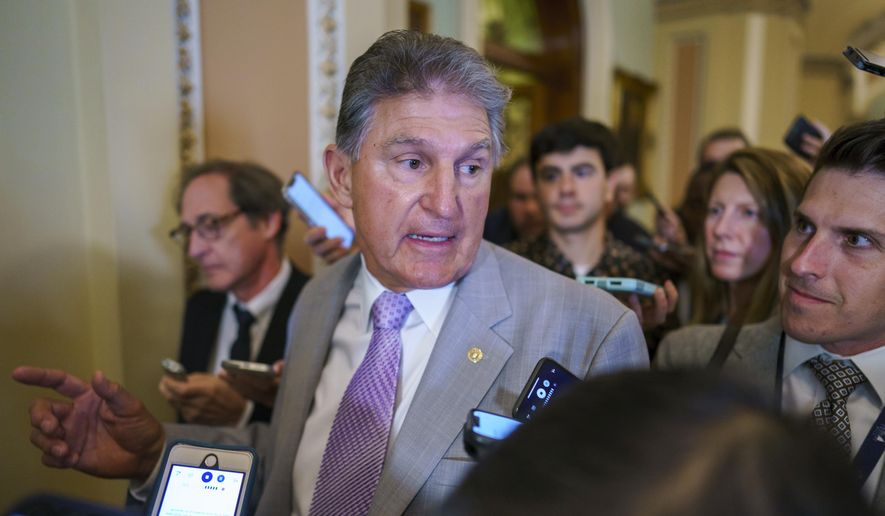A push by liberal Senate Democrats to include a 100% carbon-free electricity standard in the party’s $3.5 trillion “human infrastructure” spending deal has emerged as a stumbling block that could derail the deal and undercut a key domestic priority of President Biden.
Democrats cannot risk losing a single vote in the evenly divided Senate if the package is to have any hope of reaching Mr. Biden’s desk. But the clash over carbon is just one sign that keeping all 50 Senate Democrats in the fold looks like an impossible feat at the moment.
Democratic Sen. Joe Manchin III, the key moderate swing vote from the coal state of West Virginia, is already signaling that he is unlikely to back the clean electricity standard that Senate liberals are demanding.
“Anybody moving in a direction where they think they can walk away and just not have any fossil [fuels], that’s just wrong,” Mr. Manchin said. “It won’t happen, it can’t happen.”
Mr. Manchin’s opposition stems from how the policy is likely to hurt both domestic coal and natural gas production. The two resources, which are plentiful in West Virginia, produce nearly two-thirds of all electricity consumed across the U.S., according to the Energy Information Administration.
A clean electricity standard, as championed by President Biden and progressive Democrats, would mandate electricity suppliers reach at least 80% clean energy by 2030, with the goal of 100% by 2035. Sharply declining use of fossil fuels is inevitable if the nation wants to reach those targets.
“If my friends and colleagues think they can eliminate their way to a cleaner environment, it’ll never happen,” Mr. Manchin said.
Without Mr. Manchin and other centrists, hopes of using the budget reconciliation process to avoid a Republican filibuster would be dead. But Senate Democratic Majority Leader Charles E. Schumer of New York also faces a serious threat from his left flank.
Progressive Democrats have threatened to pull support from the reconciliation bill and the broader $1.2 trillion bipartisan infrastructure package unless it incorporates broad climate change initiatives.
For many progressives phasing out fossil fuels from electricity generation, which makes up 25% of all U.S. greenhouse gas emissions, is vital.
A clean electricity standard is “the cornerstone of the progressive, practical transformation to a clean energy future we urgently need,” said Sen. Tina Smith, Minnesota Democrat.
The divisions on clean electricity could derail the $3.5 trillion reconciliation framework just a day after the compromise was worked out by Democrats on the Senate Budget Committee.
While details remain sparse, an outline of that deal indicates that it aims for a “bold and robust” expansion of the social safety net. The deal goes further than even Mr. Biden initially proposed.
Earlier this year, the White House suggested spending upwards of $1.9 trillion on “human infrastructure,” programs such as job training for felons and home care for the elderly as opposed to the traditional programs of building roads and digging canals.
Senate Democrats, led by Budget Committee Chairman Bernard Sanders, Vermont independent, however, expanded the deal significantly.
“I think we are making progress in moving forward with the most consequential piece of legislation passed for working people since the 1930s,” said Mr. Sanders, a self-described socialist. “And it’s legislation which is finally going to ask the wealthy and large corporations to start paying their fair share.”
The package now includes long-sought liberal goals such as paid family leave, broadened access to child care and free community college. Money is further earmarked for racial justice programs and for local governments to deploy broadband internet service.
Pushing the package’s price tag upwards is a provision authored by Mr. Sanders that expands Medicare benefits to cover hearing, vision and dental services. Mr. Sanders further secured a change to the program’s prescription drug pricing system.
It is unclear if such provisions are allowed by the rules governing the reconciliation process within the Senate. Regardless, the deal faces long odds as evidenced by the dust-up between Mr. Manchin and progressives.
Mr. Biden, himself, appears to recognize how difficult it will be to get and keep all 50 Senate Democrats on board. On Wednesday, the president ventured to Capitol Hill to lobby for the proposal.
“Let’s get this done,” said Mr. Biden before heading into a meeting with the entire Senate Democratic conference.
• Haris Alic can be reached at halic@washingtontimes.com.




Please read our comment policy before commenting.